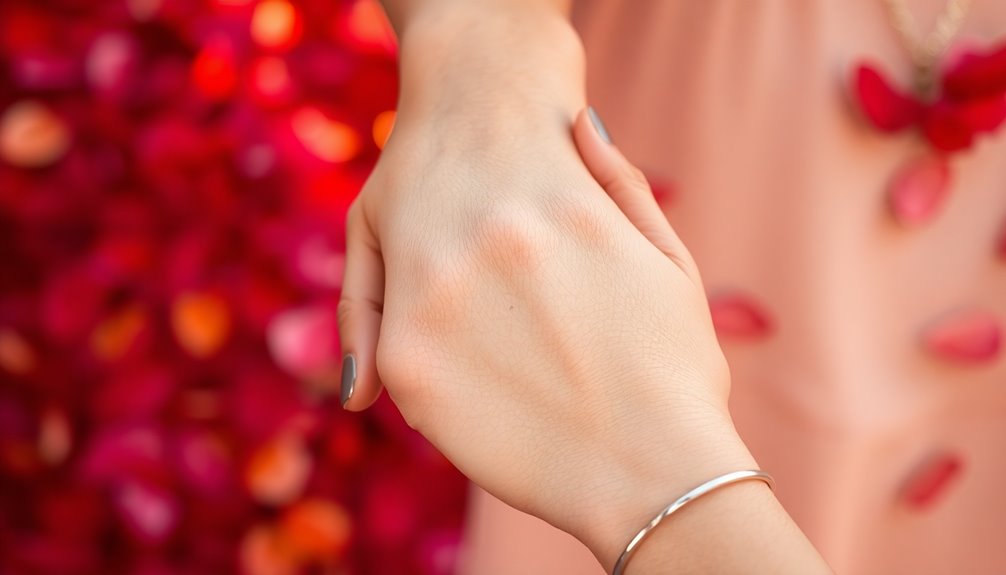Eros, the ancient Greek god of love, taps into the complexities of passion and desire. He's often depicted with a bow and arrows, symbolizing love's ability to inspire both joy and turmoil. As the son of Aphrodite and Ares, Eros reflects the duality of love, leading to personal growth through trials, as seen in myths like Eros and Psyche. Beyond romance, Eros influences friendships and community ties, encouraging deeper emotional connections. The rituals of ancient Greece celebrated his power in society. If you explore further, you'll uncover more fascinating aspects of Eros and his impact on relationships.
Key Takeaways
- Eros is the Greek god of love and desire, symbolizing the dual nature of romance, combining beauty with conflict.
- In mythology, Eros's relationship with Psyche illustrates love's transformative power through trials and personal growth.
- Eros influences various forms of love, including passionate eros, unconditional agape, and friendships (philia), enriching human connections.
- Ancient Greeks celebrated Eros through rituals, music, and poetry, highlighting love's cultural significance in their society.
- Modern interpretations of Eros emphasize emotional connections in friendships and community, fostering deeper relationships and enhanced emotional intelligence.
Introduction
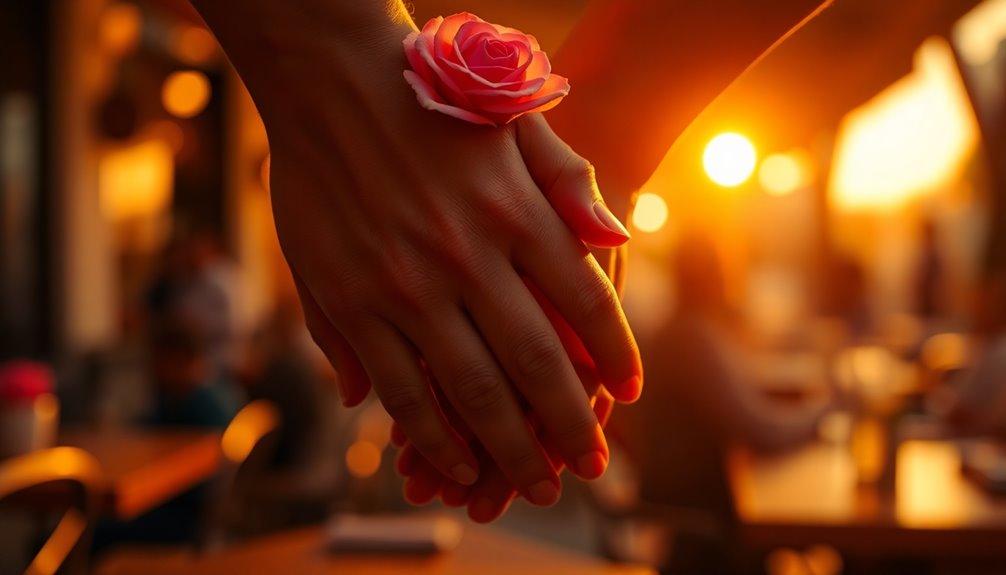
In the realm of Greek mythology, one can't overlook the significance of Eros, the primordial god of love and desire. This youthful figure, often depicted with a bow and arrows, embodies the potent force of love that can strike unexpectedly, transforming lives in an instant.
Eros isn't just a symbol; he's deeply woven into the fabric of Greek culture, representing the complexities and nuances of romantic relationships. His lineage as the son of Aphrodite, the goddess of love, and Ares, the god of war, reflects love's dual nature—both beautiful and tumultuous.
Myths surrounding Eros often explore these themes, illustrating how love can inspire passion yet also lead to conflict. The etymology of Eros, rooted in the Greek word ἔρως, hints at a deeper desire that transcends mere affection, possibly linked to Pre-Greek origins.
Throughout history, Eros has been celebrated in various festivals, particularly in Thespiae, where rituals honored him as the essence of love.
Artistic depictions of Eros have evolved, capturing changing cultural attitudes toward love and desire, from a handsome youth to a playful child, showcasing the enduring significance of primordial Eros in our understanding of love.
Scriptural Insights on Love

When you explore the Scriptures, you'll find a rich tapestry of love that includes both agape and eros.
Primary references like 1 Corinthians 13 highlight the depth of unconditional love, while secondary texts like the Song of Solomon illustrate the beauty of romantic desire.
Understanding these distinctions can deepen your appreciation for love in its many forms.
Primary Bible References
The Bible's exploration of love reveals a rich tapestry of relationships and emotions, with various forms defined through unique terms. While the term "eros" for romantic love isn't explicitly mentioned, its essence permeates the scripture. In the Song of Solomon, you see the vivid portrayal of passionate love between a bride and groom, capturing the beauty and intensity of eros through poetic imagery.
Contrastingly, the New Testament emphasizes agape, which is selfless and unconditional, as the highest form of love. Passages like 1 Corinthians 13 offer profound insights into how this love should guide your relationships.
However, the Bible also warns about the allure of eros-like love. Proverbs cautions against seductive love, illustrating how it can lead to temptation and ultimately, destruction.
The concept of love in the Bible encompasses multiple dimensions, including friendship (philia) and familial love (storge), further highlighting the complexity of human relationships.
Secondary Bible References
Biblical references to love extend beyond the primary themes of eros and agape, offering a deeper understanding of how love manifests in various relationships.
While eros is often associated with romantic love and desire, the Bible primarily emphasizes agape, which is selfless and unconditional. The Song of Solomon beautifully captures the essence of eros through its passionate expressions of marital love, illustrating the intimate connection between partners.
In the New Testament, scriptures like 1 Corinthians 13 stress the importance of love in relationships, focusing more on agape love rather than eros. Biblical teachings, particularly in Ephesians 5:25, encourage husbands to love their wives as Christ loved the Church, highlighting a nurturing and sacrificial love that transcends mere physical attraction.
This contrast between eros and other forms of love, such as philia (friendship) and agape (divine love), reveals the multifaceted nature of love in biblical contexts.
Embracing these insights helps you cultivate a more holistic understanding of loving relationships, allowing you to appreciate the depth of love in both its romantic and selfless forms.
Ancient Greek Love Rituals
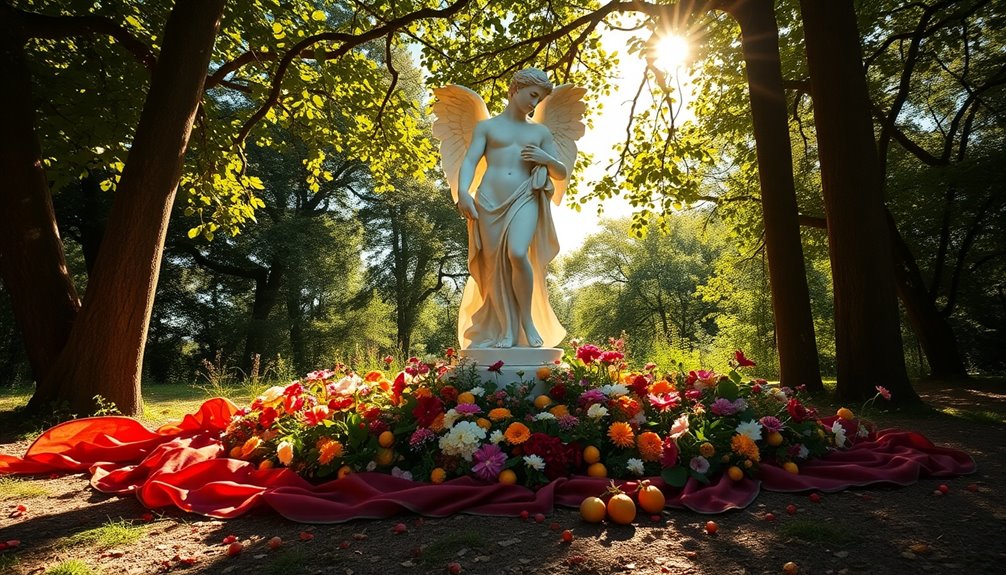
In ancient Greece, love rituals played a significant role in society, deeply intertwining the spiritual and romantic aspects of life. People sought the favor of Eros, the love god, through various offerings at altars. You'd often witness worshippers presenting flowers, particularly roses, to invoke his blessing for romantic pursuits.
Festivals like the Erotidia in Thespiae celebrated Eros, filled with music, dance, and poetry that encouraged the expression of love and desire. Young women actively participated in rites designed to secure Eros's approval for a successful marriage. Adorning themselves with floral wreaths, they took part in sacred processions, hoping to attract their desired partners.
Social gatherings known as "symposia" provided a backdrop for romantic encounters, where love poetry was recited, and playful games fostered attraction among attendees. Additionally, the use of love charms and potions, often crafted by women, was a common practice in these rituals.
These elements reflect the deep intertwining of love and magic in ancient Greek culture, showing how devotion to Eros influenced daily life and relationships.
Eros as Divine Attraction

Eros, often depicted as a youthful figure wielding his iconic bow and arrows, embodies the divine force of attraction that shapes both mortal and immortal relationships. As the god of love, Eros possesses the power to ignite passion and longing with his golden-tipped arrows, while his lead-tipped arrows can provoke aversion, illustrating the duality of desire. This complexity highlights how love can be both exhilarating and painful.
As the son of Aphrodite, Eros stands at the intersection of beauty and desire, influencing gods and mortals alike. His role in mythological narratives, particularly the tale of Eros and Psyche, showcases how he facilitates love's trials and transformative power. Through their journey, you witness Eros not just as a god of love, but as a guiding force that leads individuals toward self-discovery and unity.
Eros is also associated with sacred symbols like roses and dolphins, further emphasizing his connection to love, beauty, and the natural world.
Eros as a Complex Figure
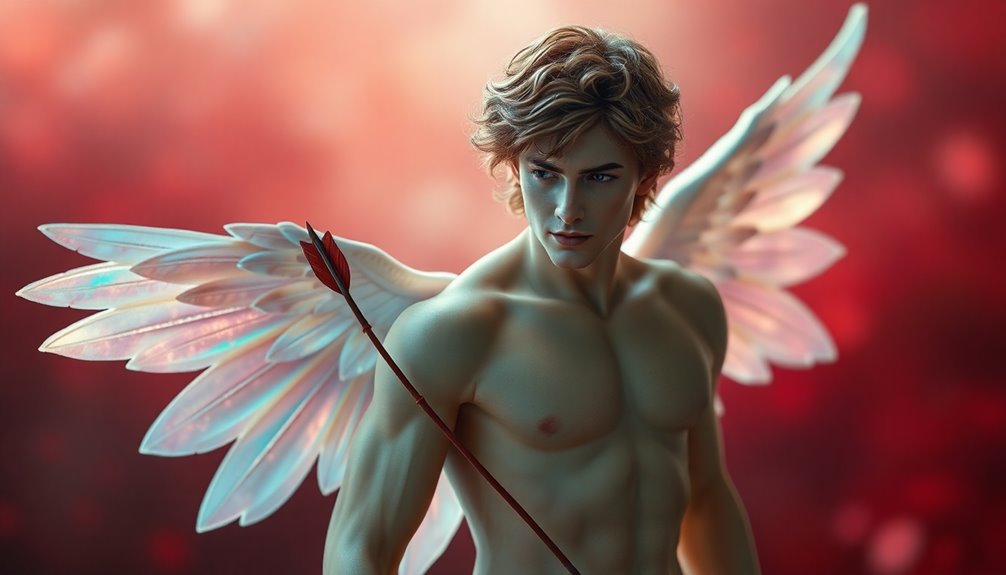
When you think about Eros, it's easy to see him as just a symbol of sexual love, but that's a misconception.
Eros embodies a broader range of emotions, including joy, chaos, and transformation in relationships.
Debunk Eros Misconceptions
The common perception of Eros as merely a god of physical love oversimplifies his true nature. While many misconceptions focus only on romantic desire, Eros embodies the complexities of emotional relationships, showcasing love's transformative power. His myth with Psyche illustrates this journey, revealing how love can lead to chaos, growth, and ultimately, union.
Often, people reduce Eros to being just the son of Aphrodite, but ancient texts offer a richer picture. Some depict him as a primordial deity born from Chaos, while others present him with different parentage. This variability reflects the multifaceted nature of love itself.
Eros's arrows further symbolize this unpredictability, with golden arrows sparking desire and lead arrows causing aversion. This duality highlights that love isn't just a blissful experience; it can also inflict pain.
Artistic depictions have evolved too, from youthful representations to mischievous portrayals, showcasing shifting cultural attitudes toward love and desire.
Eros as Purely Sexual Love
Understanding Eros as purely sexual love limits your appreciation of his deeper significance. Eros embodies more than just sensual love; he represents a complex interplay of desire, passion, and the pursuit of beauty.
In classical philosophy, Eros serves as a *daimon*, guiding you toward higher forms of love that transcend mere physical attraction. This journey emphasizes emotional and spiritual connections, highlighting that love is an evolving transformation rather than a static experience.
The myth of Eros and Psyche beautifully illustrates this point. Their relationship isn't just about physical desire; it encompasses trials, growth, and the merging of souls.
Eros's dual nature is evident in his arrows, which can inspire both romantic love and aversion, reflecting the intricate dynamics of human relationships.
While Eros may be depicted as youthful and playful in art, he truly signifies a profound understanding of love that includes emotional and spiritual dimensions. Understanding this complexity can help you recognize that shared values and life goals are crucial to forming meaningful connections.
Eros in Modern Relationships

In modern relationships, eros isn't just about romance; it also plays a crucial role in friendships and community connections.
You might find that love manifests in different ways, whether through shared experiences or meaningful conversations at community love workshops.
These interactions highlight how eros fosters deeper bonds and enriches our lives beyond traditional romantic settings.
Love's Role in Friendships
Navigating the complexities of modern friendships often involves grappling with the presence of Eros, the romantic love that can intertwine with platonic bonds. Eros plays a significant role in your relationships, enhancing emotional connections and fostering intimacy.
Friendships infused with elements of Eros often lead to increased satisfaction and fulfillment, as they encourage shared experiences and vulnerability. However, this intertwining can blur the lines between friendship and romance. You might find yourself navigating complex dynamics, where feelings of romantic interest arise unexpectedly.
Clear communication becomes essential to manage these evolving emotions and understand each other's needs. In today's culture, friendships that embrace Eros challenge traditional views on platonic relationships. They highlight the importance of emotional depth, suggesting that love can exist alongside friendship, enriching both.
This exploration of intimacy can deepen your understanding of what you truly desire in your relationships. Ultimately, recognizing Eros within friendships allows you to embrace the full spectrum of love, fostering connections that aren't just platonic but also rich with potential for growth and understanding.
It is important to acknowledge that individuals with Borderline Personality Disorder (BPD) may experience heightened emotional connections, which can influence their friendships and romantic relationships significantly.
It's about acknowledging that love can take many forms, even within the framework of friendship.
Community Love Workshops
Exploring the transformative power of Eros in modern relationships, community love workshops offer a unique space for individuals to deepen their connections with others. These workshops emphasize the significance of desire and intimacy, helping you explore the emotional aspects of love.
Through activities focused on communication skills and emotional vulnerability, you can learn to express affection more authentically, whether in romantic or platonic relationships.
In guided discussions, you'll find a balance between Eros and other forms of love, such as agape and philia. This holistic approach allows you to appreciate the different ways love manifests in your life.
Many programs encourage creative expression, using art or writing to delve into your personal experiences of love, desire, and connection. This exploration highlights the multifaceted nature of Eros.
Research shows that participating in community love workshops can enhance relationship satisfaction. You'll gain valuable tools for conflict resolution and improve your emotional intelligence, fostering healthier and more fulfilling relationships.
Eros Embodies Multifaceted Love
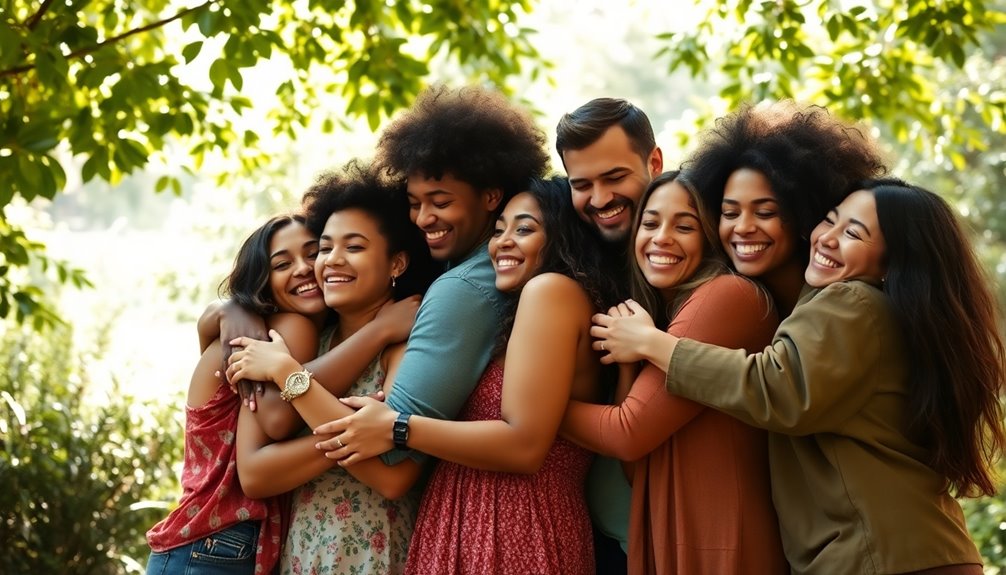
Eros, the embodiment of multifaceted love, captures the essence of desire in all its passionate and chaotic forms. You see, Eros isn't merely a symbol of romantic love; he represents the dual nature of desire itself. With his arrows, he can spark joy or chaos, leading to unexpected romantic entanglements that illustrate love's complexities.
His relationship with Psyche is a perfect example of transformational love. Through trials and challenges, their bond evolves, showcasing how love can lead to personal growth and a divine union.
In classical literature, Eros serves as a bridge between physical attraction and deeper connections. His presence reminds you that love isn't just about passion; it encompasses a broad spectrum of emotions, from ecstasy to heartache.
Eros is often depicted alongside roses and dolphins, symbols that further emphasize love's beauty and intricacy across cultures.
When you think of Eros, you understand that love is chaotic yet beautiful, capable of inspiring profound change. Embracing this multifaceted nature of love allows you to navigate your own desires with greater awareness and appreciation for its complexities. Through this journey, you may also find opportunities for self-reflection and clarity as you explore your emotional landscape.
Additional Resources
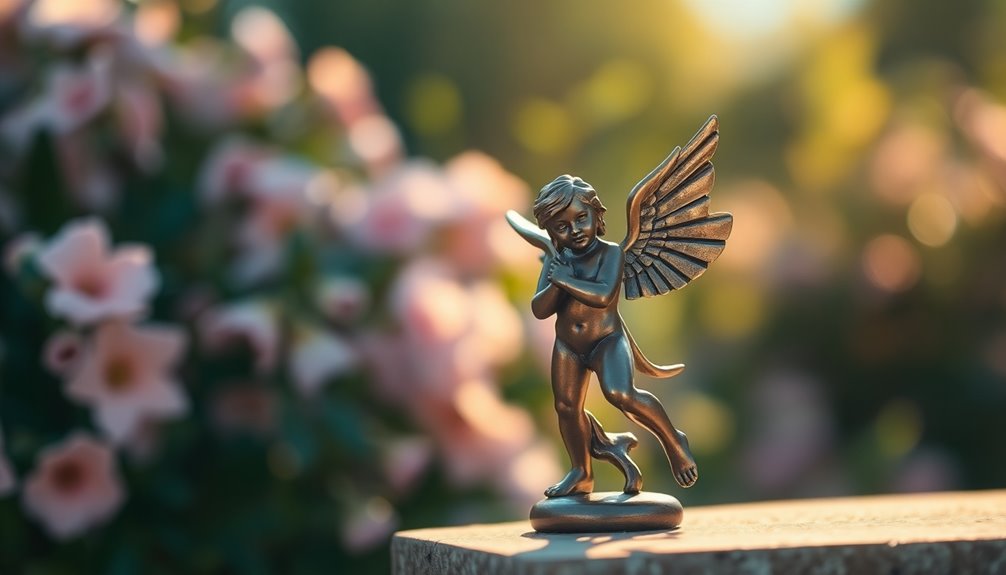
To deepen your understanding of Eros and the complexities of love he embodies, several resources can enrich your exploration.
Start by delving into classical literature, such as Hesiod's *Theogony* and Apuleius's *The Golden Ass*, which provide foundational insights into Eros's origins and his relationships, particularly his famous love with Psyche. These texts illuminate the intricate dynamics between love, trust, and growth.
For a visual representation, visit the Metropolitan Museum of Art to see the statue of Eros sleeping, created between the 3rd and 2nd century BC. This piece exemplifies the artistic interpretations of Eros within ancient Greek culture and captures the essence of his divine nature.
Additionally, Timothy Gantz's *Early Greek Myth: A Guide to Literary and Artistic Sources* offers scholarly insights into the portrayals of Eros throughout history, revealing how his influence permeates various mythological narratives.
Lastly, consider exploring the ancient Greek festivals like the Erotidia in Thespiae, which celebrate Eros, highlighting his cultural significance and enduring legacy.
Engaging with these resources will deepen your appreciation for the multifaceted nature of love that Eros represents.
Frequently Asked Questions
What Is Eros the God Of?
You might wonder what Eros represents. In mythology, he's the embodiment of love and desire.
He's not just about romantic attraction; he also symbolizes the complexities of human relationships. Eros can cause intense feelings of affection or even aversion, showcasing love's dual nature.
His influence extends beyond love stories, touching on themes of beauty and emotional connections, making him a significant figure in exploring the depths of human attraction and desire.
What Is Eros Type of Love?
Eros is a type of love that embodies passionate and romantic feelings.
It's the thrill you experience when attraction pulls you towards someone, igniting a desire that can be both exhilarating and overwhelming.
This love often involves emotional intensity, where your heart races and your thoughts revolve around that special person.
While it brings joy and connection, it can also lead to challenges, highlighting the complex nature of romantic relationships.
What Does It Mean When Someone Is Eros?
When someone is described as embodying a certain type of love, it means they're often passionate, expressive, and deeply connected to others.
You feel drawn to beauty and intimacy, seeking relationships that spark excitement and creativity.
This person often inspires desire and affection in those around them, navigating the complexities of love with both joy and challenges.
They embrace emotional connections, making each encounter a vivid experience filled with longing and pleasure.
What Is Eros and Thanos?
Eros and Thanatos represent two opposing drives in human psychology.
Eros embodies your instinct for life, love, and creativity, pushing you toward connection and pleasure.
In contrast, Thanatos symbolizes aggression and the unconscious urge for destruction, reflecting your darker impulses.
These forces coexist within you, illustrating the tension between your desires for fulfillment and the inevitable reality of loss and mortality.
Understanding this dynamic can deepen your awareness of your motivations and behaviors.

